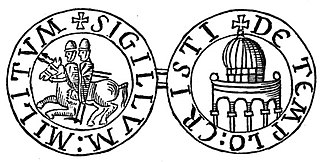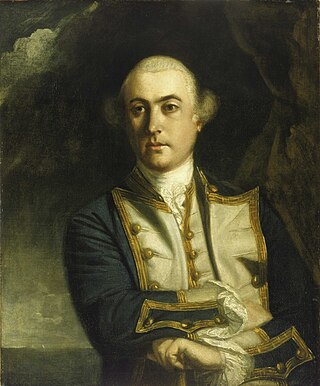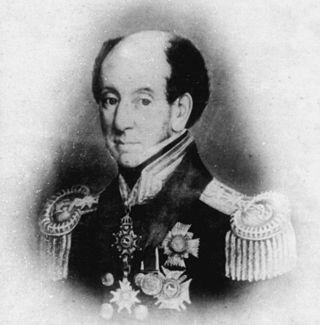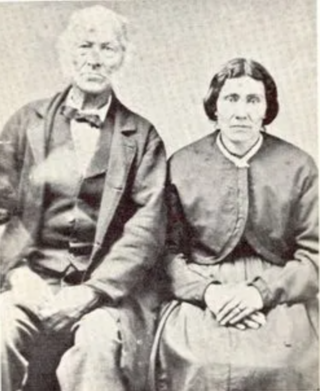
The Poor Fellow-Soldiers of Christ and of the Temple of Solomon, mainly known as the Knights Templar, was a military order of the Catholic faith, and one of the wealthiest and most popular military orders in Western Christianity. They were founded c. 1119, headquartered on the Temple Mount in Jerusalem, and existed for nearly two centuries during the Middle Ages.

Vice-Admiral John Byron was a British Royal Navy officer and explorer. He earned the nickname "Foul-Weather Jack" in the press because of his frequent encounters with bad weather at sea. As a midshipman, he sailed in the squadron under George Anson on his voyage around the world, though Byron's ship, HMS Wager, made it only to southern Chile, where it was wrecked. He returned to England with the captain of the ship. He was governor of Newfoundland following Hugh Palliser, who left in 1768. He circumnavigated the world as a commodore with his own squadron in 1764–1766. He fought in battles in the Seven Years' War and the American Revolution. He rose to Vice Admiral of the White before his death in 1786.

Chief Seattle was a Suquamish and Duwamish chief. A leading figure among his people, he pursued a path of accommodation to white settlers, forming a personal relationship with "Doc" Maynard. The city of Seattle, in the U.S. state of Washington, was named after him. A widely publicized speech arguing in favour of ecological responsibility and respect of Native Americans' land rights had been attributed to him.

The Province of Quebec was a colony in British North America which comprised the former French colony of Canada. It was established by the Kingdom of Great Britain in 1763, following the conquest of New France by British forces during the Seven Years' War. As part of the Treaty of Paris, France gave up its claim to the colony; it instead negotiated to keep the small profitable island of Guadeloupe.

Events from the year 1786 in Canada.
The Covenant Chain was a series of alliances and treaties developed during the seventeenth century, primarily between the Iroquois Confederacy (Haudenosaunee) and the British colonies of North America, with other Native American tribes added. First met in the New York area at a time of violence and social instability for the colonies and Native Americans, the English and Iroquois councils and subsequent treaties were based on supporting peace and stability to preserve trade. They addressed issues of colonial settlement, and tried to suppress violence between the colonists and Indian tribes, as well as among the tribes, from New England to the Colony of Virginia.

Middle East Command, later Middle East Land Forces, was a British Army Command established prior to the Second World War in Egypt. Its primary role was to command British land forces and co-ordinate with the relevant naval and air commands to defend British interests in the Middle East and eastern Mediterranean region.

Sir James John Gordon Bremer was a British Royal Navy officer. He served in the Napoleonic Wars against France, the First Anglo-Burmese War in Burma, and the First Opium War in China.

Hugh Henry Brackenridge was an American writer, lawyer, judge, and justice of the Supreme Court of Pennsylvania.
The following lists events that happened during 1808 in Australia.

Sir John Aubrey, 6th Baronet was a British Tory politician. In 1786, he succeeded to his father's baronetcy.
John Burke was an Irish genealogist, and the original publisher of Burke's Peerage. He was the father of Sir Bernard Burke, a British officer of arms and genealogist.

Étienne Lucier, né Lussier, was a French-Canadian fur trader active primarily in the Pacific Northwest. He was hired by John Jacob Astor's Pacific Fur Company and sent to the region to help establish Fort Astoria. Later he became a settler in the Willamette Valley. Lucier attended the Champoeg Meetings and was one of few French-Canadians or "Canadiens" to vote for the Provisional Government of Oregon, an American and Canadian civil authority for the valley. He is credited with becoming the first European descendant farmer within the modern state of Oregon.

La Salle Secondary School, Kota Kinabalu is a co-educational secondary school for boys and girls and one of the oldest schools in Kota Kinabalu on the coast of Borneo in East Malaysia.
The Chief Royal Engineer (CRE) is the official head of the Corps of Royal Engineers of the British Army.

Nonhelema Hokolesqua was an 18th century Shawnee leader and sister of Cornstalk. She was a participant in Pontiac's War and advocated Shawnee neutrality during the American Revolutionary War. Following the war, and despite her support for the United States, Nonhelema's village was attacked. Her husband, Shawnee Chief Moluntha, was killed, and Nonhelema was captured. She died later that year.
Philip Bernard was a Micmac chief.

The Leeward Islands Station originally known as the Commander-in-Chief at Barbadoes and the Leeward Islands was a formation or command of the Kingdom of Great Britain and then the United Kingdom's Royal Navy stationed at English Harbour, Antigua, Leeward Islands. It existed from 1743 to 1821.
John Lynch was an American merchant who founded the city of Lynchburg, Virginia.












